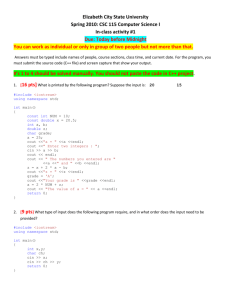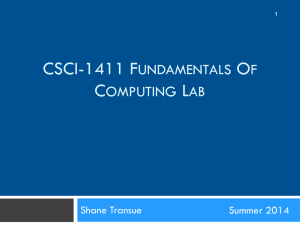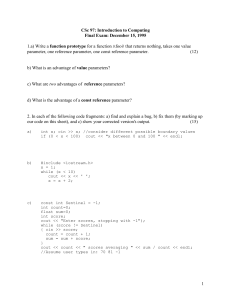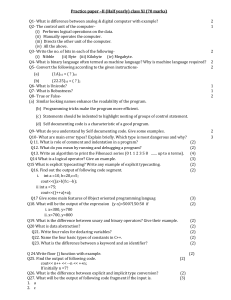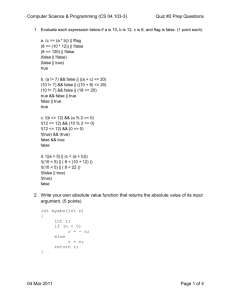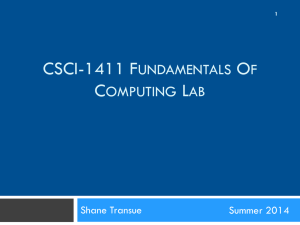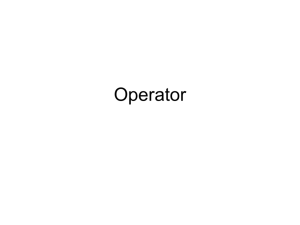IC210: Introduction to Computing Fall AY2016 — 6-Week Exam
advertisement
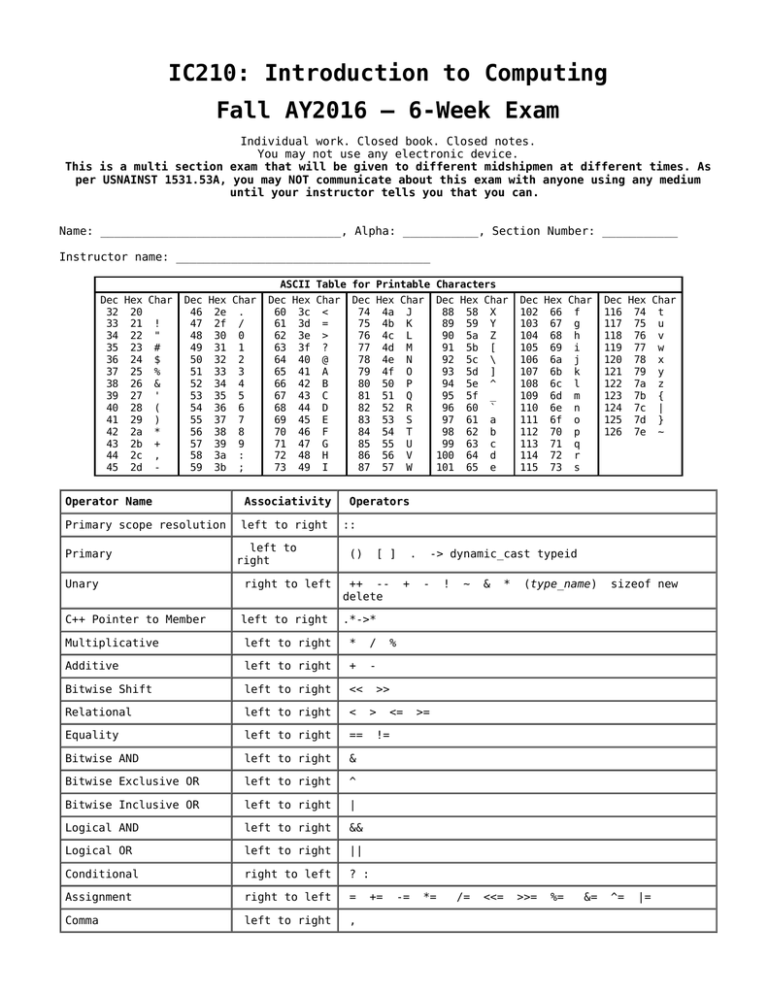
IC210: Introduction to Computing
Fall AY2016 — 6-Week Exam
Individual work. Closed book. Closed notes.
You may not use any electronic device.
This is a multi section exam that will be given to different midshipmen at different times. As
per USNAINST 1531.53A, you may NOT communicate about this exam with anyone using any medium
until your instructor tells you that you can.
Name: ___________________________________, Alpha: ___________, Section Number: ___________
Instructor name: _____________________________________
ASCII Table for Printable Characters
Dec Hex Char Dec Hex Char Dec Hex Char Dec Hex Char Dec Hex Char
32 20
46 2e .
60 3c <
74 4a J
88 58 X
33 21 !
47 2f /
61 3d =
75 4b K
89 59 Y
34 22 "
48 30 0
62 3e >
76 4c L
90 5a Z
35 23 #
49 31 1
63 3f ?
77 4d M
91 5b [
36 24 $
50 32 2
64 40 @
78 4e N
92 5c \
37 25 %
51 33 3
65 41 A
79 4f O
93 5d ]
38 26 &
52 34 4
66 42 B
80 50 P
94 5e ^
39 27 '
53 35 5
67 43 C
81 51 Q
95 5f _
40 28 (
54 36 6
68 44 D
82 52 R
96 60 `
41 29 )
55 37 7
69 45 E
83 53 S
97 61 a
42 2a *
56 38 8
70 46 F
84 54 T
98 62 b
43 2b +
57 39 9
71 47 G
85 55 U
99 63 c
44 2c ,
58 3a :
72 48 H
86 56 V
100 64 d
45 2d 59 3b ;
73 49 I
87 57 W
101 65 e
Operator Name
Dec Hex Char
102 66 f
103 67 g
104 68 h
105 69 i
106 6a j
107 6b k
108 6c l
109 6d m
110 6e n
111 6f o
112 70 p
113 71 q
114 72 r
115 73 s
Dec Hex Char
116 74 t
117 75 u
118 76 v
119 77 w
120 78 x
121 79 y
122 7a z
123 7b {
124 7c |
125 7d }
126 7e ~
Associativity Operators
Primary scope resolution left to right ::
Primary
Unary
C++ Pointer to Member
left to
right
() [ ] . -> dynamic_cast typeid
right to left ++ -- + - ! ~ & * (type_name) sizeof new
delete
left to right .*->*
Multiplicative
left to right * / %
Additive
left to right + -
Bitwise Shift
left to right << >>
Relational
left to right < > <= >=
Equality
left to right == !=
Bitwise AND
left to right &
Bitwise Exclusive OR
left to right ^
Bitwise Inclusive OR
left to right |
Logical AND
left to right &&
Logical OR
left to right ||
Conditional
right to left ? :
Assignment
right to left = += -= *= /= <<= >>= %= &= ^= |=
Comma
left to right ,
name: ________________________________________ alpha: _____________________ page 1
1. [9pts] Suppose you (successfully) give the command: g++ prog1.cpp -o george
a. Which of these is an executable program (circle all that apply): g++ prog1.cpp george
b. Which of these is a file (circle all that apply): g++ prog1.cpp george
c. Which of these is created by the command (circle all that apply): g++ prog1.cpp george
2. [20pts] Assuming the following definitions, fill in the table. Note: each expression should be
taken as independent. I.e. if one expression modifies some variable values, those modifications
do not carry over to the next expression.
expression
type
value
bool b = true;
c == 'c'
int n = 0;
c = 10*j + z
int j = 6;
double z = 1.5;
int('3' * 2)
char c = 67;
b=n
ifstream fin("foo"); // assume foo exists in
// the current directory 3/j + z
j*z
!fin
j % 3 && b
1 + j/10 > z
n != 0 || n != 10
3. [8pts] Programs are often given version numbers in the form vmajorVersion.minorVersion . A
higher majorVersion number means a more recent version of the program. When the majorVersion
numbers are the same, the larger minorVersion number denotes the more recent program. So, v3.2
is more recent than v1.8, and v3.12 is more recent than v3.9 (because 12 is bigger than 9).
Fill in the below to create a program that reads in a version number (e.g. v5.24) and writes
the word "newer" if the version is more recent than v2.7 and "not newer" otherwise. Here are
some example runs:
~/$ ./go
v1.8
not newer
~/$ ./go
v2.7
not newer
#include <iostream>
using namespace std;
int main()
{
}
return 0;
~/$ ./go~/$ ./go
v2.15
v3.0
newer
newer
name: ________________________________________ alpha: _____________________ page 2
4. [8pts] The code below reads in values i, j and k, then prints out the value of i × jk. Write a
chunk of code that is equivalent to the code below, except that a while loop is used instead of
a for loop.
int i, j, k, e = 1;
cin >> i >> j >> k;
for(int i = 0; i < k; i++)
e = e*j;
cout << i << '*' << j << '^' << k
<< " = " << i*e << endl;
5. [8pts] Consider sequences like this
d23 d2 u101 d5 u6 d19 x
representing a sequence of down (d) and up (u) moves. The x just terminates the sequence. Fill in
the blank in the following code to make a program that reads a sequence like the above from the
user (assume valid input, i.e. don't worry about error checking!) and prints out the sum of all
the "down" moves, followed by the sum of all the "up" moves. A sample run would look like this
u9 d2 d7 u3 d1 x
down = 10
up = 12
← user input
#include <iostream>
using namespace std;
int main()
{
int up = 0, down = 0;
}
cout << "down = " << down << endl;
cout << "up = " << up << endl;
return 0;
name: ________________________________________ alpha: _____________________ page 3
6. [9pts] Fill in the conditions on the if statements on the right so that they are equivalent to
the code on the right
a.
if (y == 0 || x == 0)
if (_____________________________________________)
{
{
// do nothing, avoids divide by zero
cout << 1/x + 1/y;
}
}
else
{
cout << 1/x + 1/y;
}
b.
if (w % 2 == 0) {
if (d == 6)
{
b += p;
}
}
if (_____________________________________________)
{
b += p;
}
if (a <= 'k')
{
cout << "easy";
}
else
{
if (a >= 'q')
cout << "easy";
else
cout << "tough";
}
if (_____________________________________________)
{
cout << "easy";
}
else
{
cout << "tough";
}
c.
7. [8pts] For the following questions you might want to consult the operator
precedence/associativity table on the front of this exam.
a. Is x = y != z evaluated as (x = y) != z or as x = (y != z) ? (circle one)
Explain your answer!
b. Is x == y != z evaluated as (x == y) != z or as x == (y != z) ? (circle one)
Explain your answer!
name: ________________________________________ alpha: _____________________ page 4
8. [10pts] The following program is supposed to read in a starting number from the user (we can
assume a positive number) and countdown by two's from the starting number. It sometimes works,
for example if you input 10 it outputs
10 8 6 4 2 blast off!
which is what I want. But it sometimes seems to get stuck in an infinite loop. For example, if you
input 11 you get an infinite loop rather than what I was hoping for:
11 9 7 5 3 1 blast off!
a. Annotate the code to show how to fix this problem
.
b. Explain why the original fails
sometimes, but not always.
#include <iostream>
#include <fstream>
using namespace std;
int main()
{
cout << "Enter start: ";
int k;
cin >> k;
for(int i = k; k != 0; k = k - 2)
{
cout << k << ' ';
}
cout << "blast off!" << endl;
}
return 0;
9. [10pts] Give the type for each of the expressions identified below.
#include <iostream>
using namespace std;
int main()
{
double bal = 700, pay = 550;
double rate = 3.1, expense = 45;
int week;
cin >> week;
\_________/
_____b_______
a
/
\
for(int day = 1; day <= week * 7; day++)
{
__c___
/
\
if (day % 14 == 13)
{
bal += pay;
}
bal -= expense;
bal += bal*rate/1200;
\_______/
d
string m = "You are ";
if (bal < 0)
m = m + "bankrupt";
else
m = m + "solvent";
\___________/
e
cout << m << endl;
}
}
return 0;
a. ______________________
b. ______________________
c. ______________________
d. ______________________
e. ______________________
name: ________________________________________ alpha: _____________________ page 5
10. [10pts] When I try to compile the code below, I get the following error messages:
d9.cpp: In function 'int main()':
d9.cpp:11:18: error: no match for 'operator<<' in 'fin << x'
d9.cpp:13:19: error: lvalue required as left operand of assignment
d9.cpp:19:5: error: 'total' was not declared in this scope
d9.cpp:21:11: error: 'total' was not declared in this scope
Annotate the code to show how to fix these errors. When you're done you should have a program that
correctly either prints out -1, if file tmp.txt does not exist, or prints the sum of all the
even numbers in tmp.txt, assuming it's just a file full of integers.
1 #include <iostream>
2 #include <fstream>
3 using namespace std;
4
5 int main()
6{
7 ifstream fin("tmp.txt");
8 if (fin)
9 {
10
int total = 0, x;
11
while(fin << x)
12
{
13
if (x % 2 = 0)
14
total = total + x;
15
}
16 }
17 else
18 {
19
total = -1;
20 }
21 cout << total << endl;
22 return 0;
23 }

